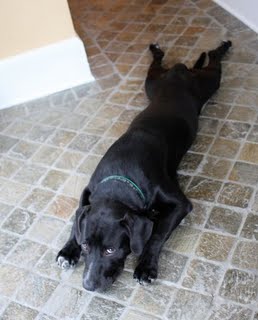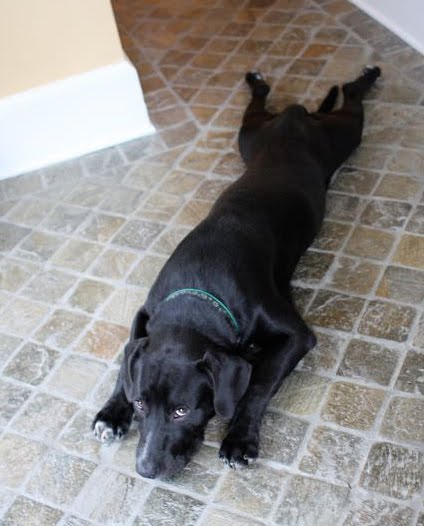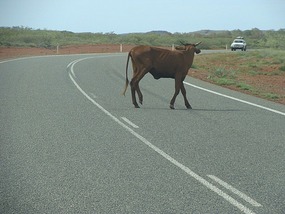
This is my pooch, not the one in the collision in this case. But he makes for great blog artwork, no?
Earlier this year I wrote about a change under hoof in New York about animals causing injury. It has long been held that animal owners could only be liable for their animals’ acts if there was a “known vicious propensity,” that being some type of aggressive or threatening behavior. Hence the phrase, “every dog gets one free bite.”
Under those circumstances the owner was strictly liable for injuries, and there was no cause of action for negligence.
But the Court of Appeals cracked that door open earlier this year in Hastings v. Suave, holding in a case where a cow wandered through a poorly kept fence into a road where it was hit, that a cause of action could exist for negligence. This had nothing at all to do with the animal’s viciousness or not, but was solely based on the conduct of the owner.
The court also held that the matter of dogs, cats and other domestic pets was not before it, and would await another day.
That day now seems on the imminent horizon, as today the Appellate Division First Department ruled in Doerr v. Goldsmith, a case where two people on opposite sides of the road in Central Park were playing with a dog. One called the dog and the other released it. A bicyclist was riding in the road and couldn’t avoid impact.
As neatly summarized by the majority opinion:
Plaintiff testified that Goldsmith “was holding a dog in a manner that he was almost hugging the dog, so he had his arm around the chest and the neck of the dog” and that Smith was “slightly bending down and clapping her hands on her upper thighs.” Interpreting Smith’s actions to be a signal to the dog (which was hers) to come to her, plaintiff screamed out, “Watch your dog.” Plaintiff then saw the dog in the middle of the road, but was unable to avoid colliding with it and being propelled off the bicycle. Defendants do not materially dispute plaintiff’s recounting of the incident. Plaintiff seeks to recover against defendants on a theory of negligence. He does not claim that the dog’s actions were a result of any vicious propensities of which defendants may have been aware.
Everybody agrees, it ain’t the fault of the dog, even though courts and lawyers eschew words such as “ain’t.”
Given New York’s historic position on these cases, the defendants moved for summary judgment saying they were immune from anything they did because New York doesn’t have a negligence cause of action. The lower court disagreed and denied the motion. Defendants’ appealed and won, but then the Court of Appeals ruled in the cow case, and so this dog case was re-visted by the appellate court.
The First Department has now reversed itself and allowed the matter to stand, based on the logic in the cow case.
The dissent disagrees, writing that the Court of Appeals didn’t rule on this, having only ruled about farm animals and specifically left dog and pet cases for another day. Leave to appeal should be granted, the dissenters argued, and if the Court of Appeals wants to change the law that is its business.
And so, with a split decision, this case will no doubt go to the Court of Appeals.
My prediction: New York’s long-held policy of granting immunity to animal owners for their own negligence (as opposed to the animal’s viciousness) will fall by the wayside as illogical. Immunity for negligence makes no sense at all, and is something that only a legislature can grant.
Lastly, a hat tip to attorney Gregory Bagen for taking this case given the state of the law when incident occurred. He took on a matter that he knew, to be successful, would take years of appellate work and expense just to get to the jury. Well done.

